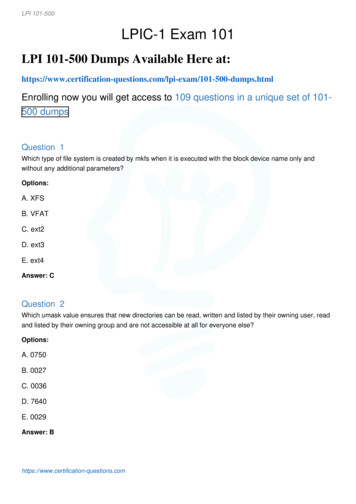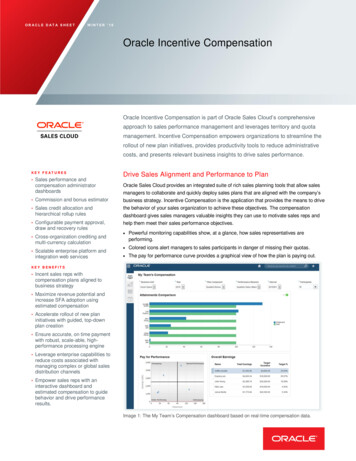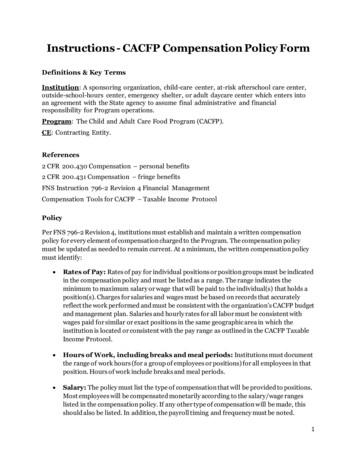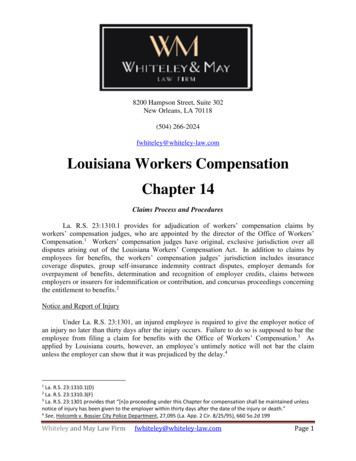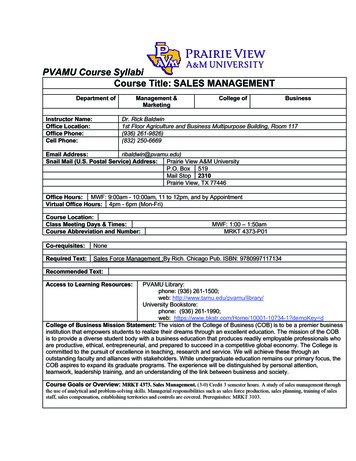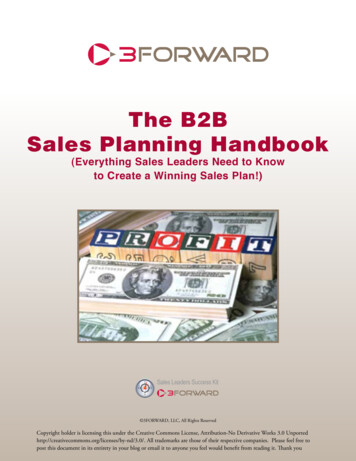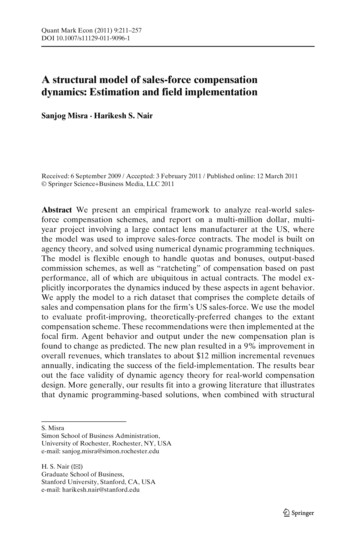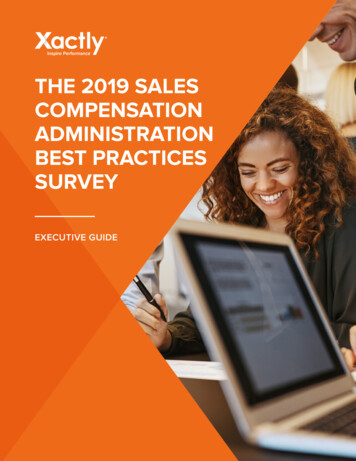
Transcription
THE 2019 SALESCOMPENSATIONADMINISTRATIONBEST PRACTICESSURVEYEXECUTIVE GUIDE1
THE 2019 SALES COMPENSATION ADMINISTRATION BEST PRACTICES SURVEYTABLE OF CONTENTS:Executive Summary . . . . . . . . . . . . . . . . . . . . . . . . 4Compensation Execution . . . . . . . . . . . . . . . . . . . 6Payment Accuracy . . . . . . . . . . . . . . . . . . . . . . . . . 8Continued Compensation Optimization. . . . . . . 11Survey Methodology and Demographics. . . . . 14 2019 Xactly Corporation. All rights reserved.2
THE 2019 SALES COMPENSATION ADMINISTRATION BEST PRACTICES SURVEYSECTION 1EXECUTIVESUMMARY 2019 Xactly Corporation. All rights reserved.3
THE 2019 SALES COMPENSATION ADMINISTRATION BEST PRACTICES SURVEYSECTION 1EXECUTIVE SUMMARYFrom June through July 2019, Xactly conducted the annual Sales Compensation Best PracticesStudy to define the key trends and metrics around sales compensation administration. Incentivecompensation management (ICM) is a key foundational component of success for companies of allsizes to plan, execute, and optimize their business operations.However, many respondents ranked their biggest compensation administration challenge as beingunable to implement best practices as well as lack of data centralization and standardization ofprocesses.This means that organizations are not using sales compensation as strategically as they couldbe and provides an opportunity for many to focus on improving, especially given the correlationsbetween sales compensation helping improve overall performance and the impact that accurate,on-time payments have to ensure sales representatives’ success.Businesses face three key compensation administration challenges:1. Implementing Best Practices2. Lack of Data Centralization3. Non-standardized ProcessesMany companies struggle with optimizing their compensation administration. The biggestchallenge is implementing best practices, followed by lack of centralization and standardization.When organizations are unable to optimize their compensation administration, they suffer withinefficient processes, data and payment inaccuracy, and a need for a higher number of FTEs. 2019 Xactly Corporation. All rights reserved.4
THE 2019 SALES COMPENSATION ADMINISTRATION BEST PRACTICES SURVEYSECTION 2COMPENSATIONEXECUTION 2019 Xactly Corporation. All rights reserved.5
THE 2019 SALES COMPENSATION ADMINISTRATION BEST PRACTICES SURVEYSECTION 2COMPENSATION EXECUTIONThere is no right team size to administer compensation.The number of full time employees (FTEs) needed to administer compensation varies acrosscompany size. Half of smaller businesses with 1-50 employees (56%) employ a team of 1-2individuals, while more than half of larger organizations with more than 1,000 employees (57%)employ a team of 3-5 people to administer compensation.How many FTEs are needed to administer compensation?COMPANY SIZE VS. NUMBER OF FTESNUMBER OF FTEs1-24%7%6-93-510 00 COMPANY SIZEFor most organizations, the number of FTEs needed depends on the level of service expectedfrom the compensation administration team. Ultimately, a higher level of service requires morededicated resources; however, with optimized incentive processes, the number of resources canbe decreased while maintaining a higher level of service. 2019 Xactly Corporation. All rights reserved.6
THE 2019 SALES COMPENSATION ADMINISTRATION BEST PRACTICES SURVEYSECTION 3PAYMENTACCURACY 2019 Xactly Corporation. All rights reserved.7
THE 2019 SALES COMPENSATION ADMINISTRATION BEST PRACTICES SURVEYSECTION 3PAYMENT ACCURACYWhen it comes to incentive payout accuracy, 83% of companies admit they have inaccuracieswithin their payment schedules, resulting in compensation adjustments, which erodes sellers’confidence and can cost the business both time and money.Compensation payment accuracy is improved with automation of processes.Nearly ⅔ of responding organizations (70%) have already automated their incentive compensationmanagement (ICM) and the positive impact from it shows. Businesses that automate incentivecompensation processes have fewer errors than companies using manual processes, with morethan ¾ of respondents achieving 95% or greater payment accuracy.PAYMENT ACCURACYTHIS YEARLess than 90%3%90%-94%10%95%-99&47%Greater than 99%39%Payout accuracy is an important metric.The average company spends at least 10% of revenue on incentive payments—that’s a biginvestment. Knowing this, maximizing operations efficiency and data accuracy is a key initiative ofleadership to drive growth effectively.If you don’t track accuracy, you can’t improve it.Failing to track commission accuracy equates to making a best guess when paying out employees.Tracking accuracy and the cost of errors as a percentage of total expense, including the quantityof errors, can help gain a clearer understanding of opportunities that improved payment accuracyoffers. 2019 Xactly Corporation. All rights reserved.8
THE 2019 SALES COMPENSATION ADMINISTRATION BEST PRACTICES SURVEYAutomation increases payout accuracy.Automation transforms the entire sales compensation process. Incentive compensationmanagement (ICM) tools ensure that operations run smoothly and the ROI of compensation ismaximized. Ultimately, automated solutions do three main things: improve data integrity, reducecommission errors, and streamline compensation administration processes.1.Improved Data Integrity: Automation creates a single source of truth for incentivecompensation data. This helps eliminate data discrepancies across the entireorganization for more accurate sales planning and forecasting.2. Reduced Errors: Automated commission calculation helps reduce human error andensure accurate payment calculations by establishing quality control measures.3. Increased Efficiency: Teams can improve and simplify the compensation administrationprocess to reduce time to payout, increase accuracy, and build trust throughout theorganization. 2019 Xactly Corporation. All rights reserved.9
THE 2019 SALES COMPENSATION ADMINISTRATION BEST PRACTICES SURVEYSECTION 4CONTINUEDCOMPENSATIONOPTIMIZATION 2019 Xactly Corporation. All rights reserved.10
THE 2019 SALES COMPENSATION ADMINISTRATION BEST PRACTICES SURVEYSECTION 4CONTINUED COMPENSATIONOPTIMIZATIONCompensation administrations optimization should be an ongoing process. For companies tosucceed, they must continuously analyze their compensation processes and incentive plansand make changes to improve. The first step, if you haven’t already, is automating compensationadministration. With the right tools in place to optimize processes and execution, businesses canthen begin to implement best practices more effectively.Best Practices for Compensation Administration1.Establish Compensation Ownership: It’s crucial that organizations clearly identify whatteam(s) own compensation administration process. There’s no right answer for thebest owner—whether sales operations or finance—but clarity of ownership is a must tosucceed.2. Continue Investing in Compensation Optimization: Businesses must invest in theircompensation administration resources (people, tools, etc.) to optimize and improve it.In order to continuously optimize, you must continuously invest.3. Spend the Necessary Time to Ensure Data Integrity: Before companies can beginimplementing automated solutions, they must take the time to gather, compile, andclean their data. Automating is a crucial step, but you cannot automate low-quality dataand poorly-designed plans and expect to succeed.4. Simplify Incentive Design and Reduce Plan Complexity: Previous studies have indicatedthat less complex incentive plans result in higher performance, efficient execution, andlower rates of sales rep turnover.5. Take Advantage of Reporting and Analytic Insights: Automated ICM platforms providedeeper visibility into performance and commissions data. In turn, access to theseinsights can help strengthen compensation planning and execution. 2019 Xactly Corporation. All rights reserved.11
THE 2019 SALES COMPENSATION ADMINISTRATION BEST PRACTICES SURVEYCompensation is only a part of the optimization process.Many businesses recognize that automation plays a key role in their compensation administrationoptimization. However, it’s important to remember that incentive compensation management (ICM)is just one part of optimization.ICM eliminates the tactical focus around compensation by automating compensation calculation,reducing data inaccuracies, and maximizing operational efficiency. But the benefits of automationextend far beyond compensation.As companies mature, they must shift their compensation mindsets from tactical to strategic byautomating and optimizing additional internal sales planning processes, such as capacity, quota,and territory optimization. This maturation process evolves a company to focus on the holisticsales performance management (SPM) that goes beyond ICM to including sales planning andperformance optimization. Learn more about automating additional planning and executionprocesses in this SPM workbook. 2019 Xactly Corporation. All rights reserved.12
THE 2019 SALES COMPENSATION ADMINISTRATION BEST PRACTICES SURVEYSECTION 5SURVEYMETHODOLOGYANDDEMOGRAPHICS 2019 Xactly Corporation. All rights reserved.13
THE 2019 SALES COMPENSATION ADMINISTRATION BEST PRACTICES SURVEYSECTION 5SURVEY METHODOLOGY ANDDEMOGRAPHICSThe survey was administered to compensation administration professionals at organizations ofall sizes and industries, from July through August 2019. Data was collected from more than 90organizations, representing all major industries and geographies, including North America , AsiaPacific, and Europe.Study respondents represent a mix of companies from all sizes, ranging from 3 million to 100billion in revenue.Sales Force Size Distribution of RespondentsThe majority (29%) of survey respondents are supporting a sales organization with more than10,000 sales representatives, followed by 28% of companies with 50-750 sales representatives.Less than 50 sales reps - 1%751 - 2,500 sales reps - 20%5,001 - 10,000 sales reps - 12%51 - 750 sales reps - 28%2,501 - 5,000 sales reps - 10%10,000 sales reps - 29% 2019 Xactly Corporation. All rights reserved.14
THE 2019 SALES COMPENSATION ADMINISTRATION BEST PRACTICES SURVEYABOUTXACTLY 2019 Xactly Corporation. All rights reserved.15
THE 2019 SALES COMPENSATION ADMINISTRATION BEST PRACTICES SURVEYABOUT XACTLYXactly delivers a scalable, cloud based enterprise platform for planning and incenting salesorganizations, including sales quota and territory planning, incentive compensation management,and predictive analytics. Using this powerful sales performance management (SPM) portfolio,customers mitigate risk, accelerate sales performance, and increase business agility. Combinedwith Xactly Insights, the industry’s only empirical big data platform, Xactly empowers companieswith real-time compensation insights and benchmarking data that maximize the bottom line. Withan open, standards-based architecture, Xactly seamlessly integrates within an enterprise’s existinginfrastructure, with the ability to work with any ERP, CRM, or HCM application, while meeting thehighest enterprise standards in security, reliability, and privacy.To learn more about Xactly and the latest issues and trends in SPM software, follow us on Twitter,LinkedIn, and the Xactly Blog.Xactly Strategic Services is a consulting practice that combines best-in-class technology,incentive compensation expertise, and big data from Xactly Insights to help clients improvethe effectiveness and efficiency of their incentive compensation program and the technologythat supports their compensation administration processes. Our consulting engagements aredesigned to optimize clients’ incentive processes, their use of the Xactly solution, and their salescompensation plans, allowing for a greater return on your incentive compensation investment.If you are interested in learning more about how Strategic Services can help, please let yourcustomer success representative know, or reach out directly to the team atstrategicservices@xactlycorp.com. 2019 Xactly Corporation. All rights reserved.16
Sales Force Size Distribution of Respondents The majority (29%) of survey respondents are supporting a sales organization with more than 10,000 sales representatives, followed by 28% of companies with 50-750 sales representatives. . incentive compensation expertise, and big data from Xactly Insights to help clients improve .


